Citrine: what is it, who is it for, properties and meaning
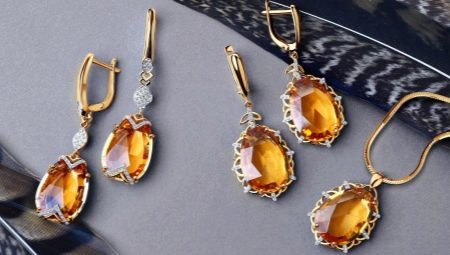
? Citrine is a bright yellow sunstone. It is credited with the ability to bring monetary luck, prosperity and well-being to its owner. We revered the gem for its jewelry, magical and healing powers. Consider what a mineral is, what properties it has, and for whom it can become a lucky talisman.
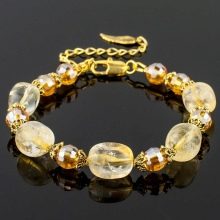
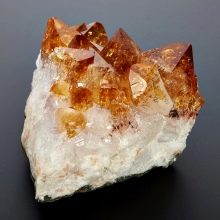
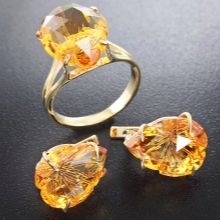
What it is?
Citrine is a semi-precious stone that is a kind of quartz. Rock crystal, amethyst, rose quartz, aventurine, cat's eye, rauchtopaz are its closest relatives. It differs from its fellows only in its extraordinary yellow color. Some sources claim that the gem got its name from the French citron, which means "lemon". Others - that from the Greek citrona, translated - "yellow".
The first mention of the stone dates back to the 3rd century BC. NS. In ancient Greece, it was worn only by famous people, politicians and orators. The ancient Romans called him the philosopher's stone, bestowing success in the art of eloquence and rhetoric. In the Middle Ages, citrine was called golden topaz, Bohemian topaz, Spanish topaz, saffronite, although it has nothing to do with these gems. The stone received its official name only in 1747, when the chemist Valerius gave its scientific description and characteristics in special literature.
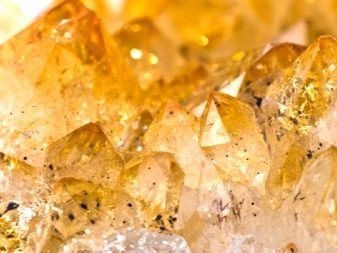

For its beautiful rich yellow color, the stone fell in love with the nobility and royal people. Jewelry was made with it, it was included in the crowns of rulers and other attributes of the supreme power. Official documents and personal correspondence were sealed with a jewel.Icons, religious objects, stained-glass windows in temples, palaces and rich houses were decorated with stones with sunshine. In the wild tribes of Africa and South America, they sincerely believed that citrine protects against the poisonous bites of snakes and scorpions.
In the modern world, as before, citrine is a favorite of jewelers. It is easy to process and does not require time-consuming work to create a cut. Rings, earrings, necklaces, beads, brooches, tiaras are made with crystal.
The gem looks great both in a metal frame and without it. Jewelery from citrine in white and yellow gold is magnificent.
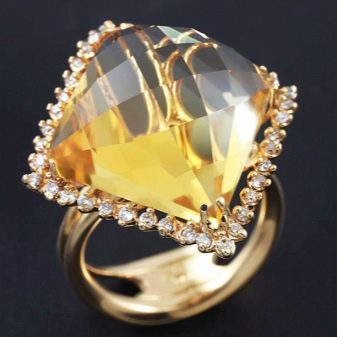
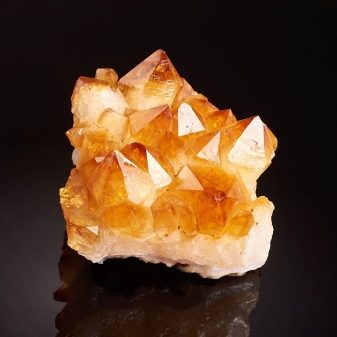
The price of natural citrine depends on the color, weight, purity and saturation of the mineral. The most expensive is a clear, unclouded crystal. It is cut like a diamond. For less transparent stones with cracks, flat cut or cabochon are used.
Consider a few facts from the world of celebrities.
- The famous actress Angelina Jolie presented the curator of the US National Mineral Collection (Smithsonian Institution) with a necklace made of 18-carat yellow gold and 64 citrines in the shape of pillows with a pear in the center. Jolie's Citrine Necklace was created by the actress together with the world famous high jewelry fashion designer Robert Prokop.
- Prince William's wife Kate Middleton has also been spotted in love with citrine. Several times she was seen wearing earrings with solar quartz.
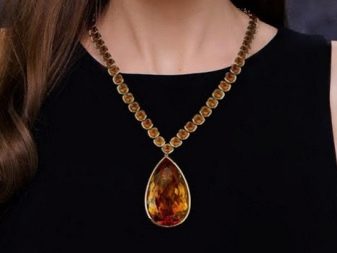

Views
Citrine is classified primarily by color.
- Pale yellow is the natural color for the mineral.
- The stone receives a golden yellow color due to thermal processing at a temperature of 300 degrees.
- Honey and bright orange citrines are called "Madeira" after the famous wine. Such specimens are mined mainly in Brazil.
- Green citrine is the rarest stone. Its value is low, as it quickly fades in the sun.
- Ametrine is a rare gem native to Bolivia. Combines citrine and amethyst segments.
- There is also a yellow translucent mineral interspersed with foreign metals. Jewelers call this kind of mossy citrine. It has a very high monetary value.
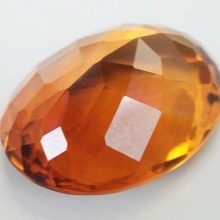
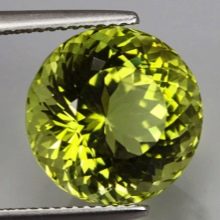
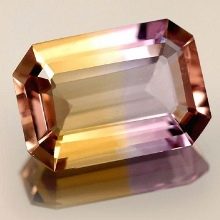
Where is it mined?
Citrine is less common in nature than other types of quartz. Mineral deposits are found in metamorphic, igneous rocks, sedimentary rocks. It is obtained by crystals of various sizes, druses and geodes. The largest deposits of this type of quartz are located in Brazil (Bahia, Goias, Minas Gerais). Here, the mineral is mined on an industrial scale, and it was there that one of the largest minerals in the world was extracted. Its size is 2258 carats or 450 grams. It is presented to the public at the Smithsonian Institution Museum in the United States. In size, it is second only to the giant citrine called "Malaga", which has reached 20,200 carats.
The mineral is mined in large volumes in India and the USA, in the state of Colorado. Small deposits are being developed in Argentina, Myanmar, Namibia, Scotland, France, Kazakhstan, Spain, Madagascar. In Russia, citrine began to be mined in the Urals during the time of Catherine the Great. Savvy craftsmen baked crystals in bread or ash to give them a richer color. Ural gems have a wine-yellow hue.
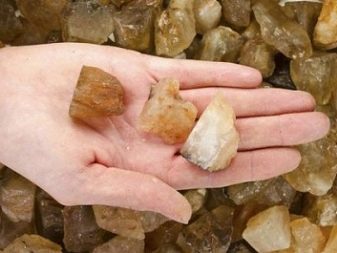

Properties
Citrine is an unusual stone, and therefore its properties are not limited only to the physical spectrum. Consider the stone from different angles.
Physical and chemical
Citrine is a type of silica-silicate, in other words, it is a silicon oxide with impurities of lithium, iron, aluminum or hydrogen. It is the inclusions of these elements that give the mineral its color, and distinguish it from other types of quartz. The color palette of citrine ranges from light lemon to amber yellow. Natural citrine is usually light lemon in color. Darker ones are obtained as a result of thermal treatment.
Other parameters:
- hardness - 7 units, easily scratches glass;
- density - 2.65 g per cubic meter cm;
- transparency;
- glass luster;
- the type of symmetry is trigonal.
In living nature, citrine is formed by large crystals, often forming druses, granular aggregates and grains.
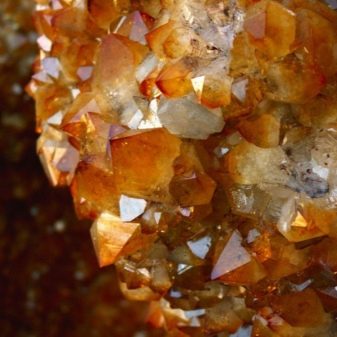
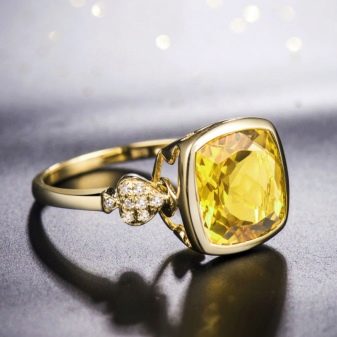
Magical
Since ancient times, it was believed that citrine can make a man smart and attractive, and a woman - to make motherhood happy. As soon as you put a pebble in your pocket, shyness, timidity and tongue-tiedness immediately disappeared. Undoubtedly, citrine has magic. The amazing property of a stone not to absorb or accumulate negative energy makes it a very powerful talisman and a talisman against troubles. The warm, lively energy of the stone helps to restore the strength of the physical body and establish mental balance.
The gem saves from insomnia, protects from nightmares, clarifies consciousness, bestows purity of thoughts. Citrine enhances sociability, grants the ability to speak beautifully and convince the interlocutor. It endows its owner with self-confidence and will help to win in any discussion. The happy owner of the gem, in harmony with the energy of the stone, evokes the sympathy of others, is pleasant to everyone, everyone likes it.


The meaning of the stone for a person is ambiguous. Citrine has a drawback: it is able to bring happiness and good luck not only to honest people with spiritual aspirations. People who are dishonest, but possessing such a treasure, use the power of the stone, rub themselves into people's trust and turn their dark shenanigans. This property of the stone has been known since the Middle Ages. Card cheaters, gamblers, adventurers of all stripes revered citrine as their talisman.
In Russia, citrine was nicknamed a merchant's stone because of its ability to bring monetary luck. For business people, it has become a symbol of abundance and prosperity. Citrine makes people generous and encourages sharing. The gem favors people with an entrepreneurial streak, able to benefit from information, often moving in space due to the nature of their activities.
Lemon quartz will be an excellent assistant for people involved in sales, casinos, stock exchanges, and the media.


In Japan, citrine is considered a stone that promotes long life and prosperity. For practitioners, meditation, prayers, chanting of mantras, citrine beads will help to focus and immerse oneself in a deep process of self-discovery. When interacting with the stone, mental abilities increase, concentration improves, short-term memory is stimulated, and wisdom is gained.
The stone also patronizes people who are engaged in delicate manual labor: jewelers, surgeons, artists, craftsmen, as well as magicians and fortunetellers along the lines in the palm of your hand. To enhance intuition and creative inspiration, it is recommended to keep citrine on your desktop in an easy-to-see place. When making a decision, you should pick it up, focus on the problem. The choice will be more thoughtful and deliberate.
Citrine is able to free its owner from various kinds of addictions: smoking, alcoholism. For these purposes, you can use the long-noticed property of the stone to transfer its qualities to water, and to take "citrine" water. The mineral is immersed in a glass of water for a few minutes. Then the water is drunk in several stages. The procedure is performed by the course.


It should be remembered that magical and healing properties have only natural pure stones... The stone will show its capabilities in full force, if you wear it constantly in the form of jewelry: pendants, rings, rings. Business people are advised to wear a citrine ring or signet on their little finger to achieve commercial success. To speakers to increase the influence on the masses - on the middle or index finger.
To reveal intuition, beautiful ladies can decorate themselves with citrine earrings. For regular cash flows, a pebble is placed in a wallet.Feng Shui practitioners recommend placing items with citrine in the southeast sector of the room to increase prosperity. This can be druze or jewelry, for example, in the form of a money tree.
As a gift, jewelry with citrine in the Russian tradition is presented to spouses on the thirteenth anniversary of their life together.
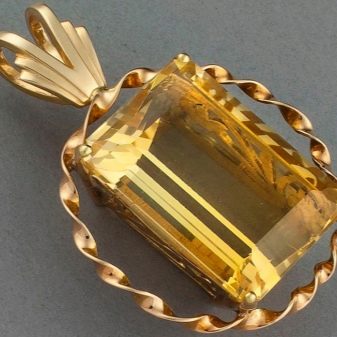
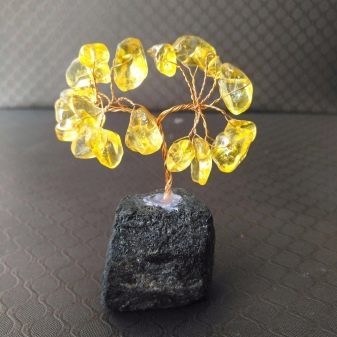
Therapeutic
Lithotherapists recognize citrine's ability to help a person with:
- sensitivity to weather changes;
- chronic fatigue syndrome;
- problems with the gastrointestinal tract;
- diseases of the genitourinary system;
- diseases of the brain;
- speech impairment in children;
- poor eyesight.


It is believed that citrine has the most healing effect on the umbilical chakra and solar plexus, healing the organs in their area.
The mineral is able to help in solving the problem of infertility, as well as in climatic disorders.
Lithotherapy uses citrine for diabetes, metabolic disorders, endocrine system disorders. Observations have shown that contact with a stone improves the absorption of calcium, which affects the appearance of nails, hair, teeth, and is an excellent prevention of osteoporosis.


Who is it suitable for?
Astrologers believe that the positive solar energy of citrine will suit any zodiac sign. However, there are some nuances.
- Aries, citrine, on the one hand, will benefit, revealing the gift of eloquence, and on the other, it can bring trouble, increasing the aggressiveness of the representatives of the fire sign, inclined to violence and excessive assertiveness.
- In Taurus, the gem will awaken creativity, spiritualize its aspirations, teach self-discipline and open up new horizons for self-realization. A good stone for a sign.
- For Gemini, citrine is able to bring benefit and good luck only in good and pure endeavors; it will attract financial stability and take off on the career ladder. The negative manifestations of this sign, such as a tendency to shenanigans and dishonest adventures, will only intensify, so you should be careful.
- Cancers can contribute to strengthening authority, strengthening moral foundations and resolving conflict and difficult situations in relationships with relatives. Recommended to be worn by socially active representatives of this sign.
- For Leo, solar citrine will be a reliable friend and helper in such "royal" matters as leadership and organization of the process. If you are not proud of the power received, then the gem can become an ideal talisman for such individuals.
- For Virgins, citrine will bring material well-being, but only with the development of generosity and the ability to share.
- Libra will help to renounce unnecessary doubts, and with adequate self-esteem, it will present the opportunity for a career takeoff.
- As a general rule, citrine is not very favorable for Scorpio. It can increase pressure, internal control, which will lead to suppression of oneself as a person. It all depends on the personality of the person. It is worth carefully monitoring your feelings when in contact with a stone.
- For Sagittarius, the stone guarantees meeting the right people, establishing business contacts and improving health.
- The miracle mineral will help Capricorn to choose the right path, go through all the obstacles and achieve the goal, endow it with sunny enthusiasm and a positive attitude towards oneself and one's capabilities.
- With the friendly support of citrine, Aquarius can achieve cherished goals in a magical way, but you should not abuse these powers.
- The citrine talisman will fill fish with vitality, give energy, vivacity. The main thing is not to cross what is permitted.
It is believed that the greatest benefit lemon quartz will bring to people who bear names such as Angela, Daria, Rosa, Carolina, Yanina, Valentin, Timofey, Leonid and Nikita.


How to distinguish from a fake?
Citrine is in demand among jewelers as a precious stone, and among collectors as a valuable mineral. Large druses and crystal geodes decorate the interiors.
Natural citrine has a high price tag. Therefore, smoky quartz or heat-treated amethyst is more often found under his name. They represent an imitation of a crystal. Fake citrines have the most popular colors, deep amber or reddish orange. It is difficult for an average person to distinguish an artificial crystal from a real stone. This is only available to an experienced jeweler and mineralogist, but you can try by paying attention to the following points.
- If you see a stone with a thick amber, honey-brown color or a reddish hue, then most likely in front of you is a burnt crystal. In nature, stones with such qualities are practically not found. Untreated stones have light shades.
- Natural stones have the ability to change color depending on the angle of view, in the science called pleochroism. Gems processed by hot temperatures do not possess such quality.
- The white matte base, stretching towards the top of the crystal, is a sign of the heat treatment of the crystal.
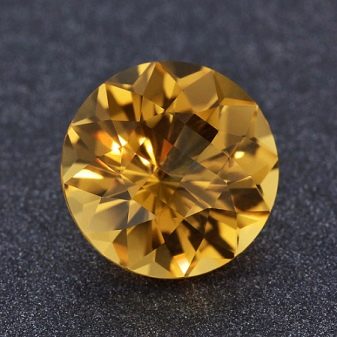
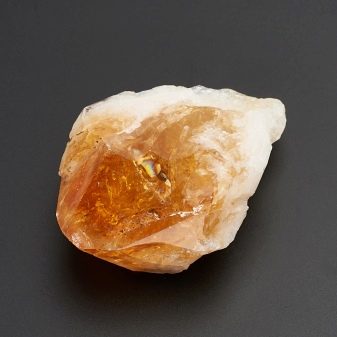
A glass or plastic counterfeit is easier to identify.
- In natural stone, the transitions from color to color are smooth, in glass they are sharp, with clear boundaries.
- The sun's rays, passing through citrine, bifurcate. You will not notice such an effect in glass.
Citrine can also act as a fake stone. It is passed off as the more expensive topaz and emerald. Minerals vary in density.
A refractometer, a special device that measures the refractive index of light in a medium, will help to distinguish a fake.
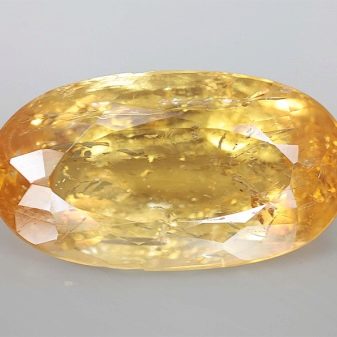
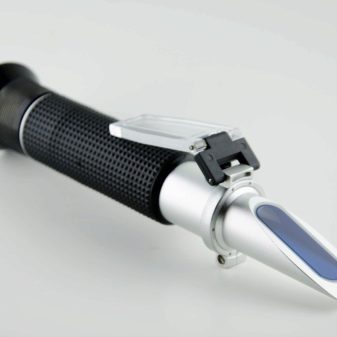
How to take care of it properly?
Real citrine is very durable and can scratch other stones, so it is stored separately. Heat-treated gems, on the other hand, are fragile. They need protection from falls and bumps. Gems can fade over time and should be protected from direct sunlight.
The mineral does not like interactions with cosmetics and perfumery products. The best place to store citrine is in a thick, soft cloth bag or a special compartment for jewelry or minerals. The jewelry is washed with a brush in a mild soapy solution. The gem does not need energy cleansing.
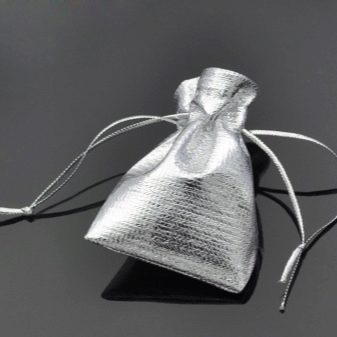
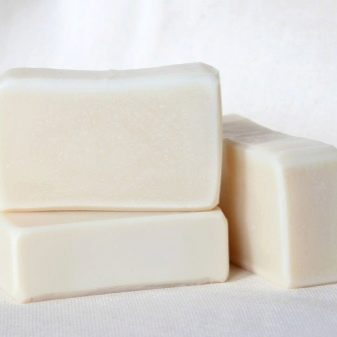
Compatibility with other stones
When combining citrine with other minerals, it is important that the energy characteristics of the stones do not conflict with each other, but harmoniously complement each other. Citrine increases its beneficial effects when combined with carnelian and amethyst. The gem works well with jade and pomegranate. Zircon, tourmaline and opal weaken the crystal. Rubies and diamonds are also not the best neighbors for citrine.
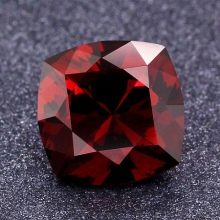
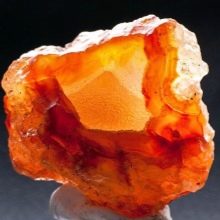
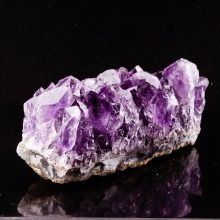
For the features of citrine, see the next video.








